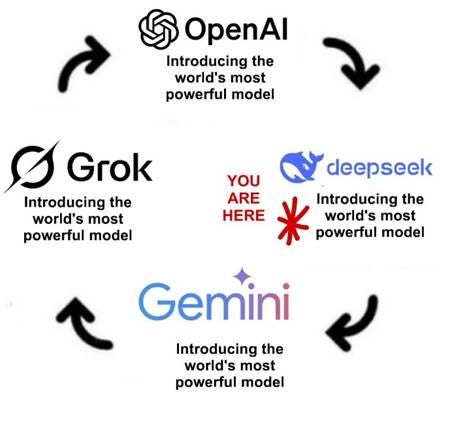AI and the Future of Work
AI's disruption of jobs has begun. It will accelerate. AI and robots will serve a long-tail of unmet needs, and manager of AI agents will be the remaining human job.
Why “AI Is Taking Our Jobs” Is Trending
"Cancer is cured, the economy grows at 10% a year, the budget is balanced — and 20% of people don't have jobs." – Dario Amedeo
This AI revolution is triggering repeated waves of technology whiplash. The latest better-than-ever AI models and AI agents first hits us with shock-and-awe at their newfound power. Then, after the novelty wears off, we figure out how best to use the new tools (that were merely toys not long ago).
Then the real future shock hits: if AI is able to do what only human intellectual labor could do before, what are we humans to do?

These latest AI agents are capable of creating complex software applications, detailed research reports, and websites on demand. They are moving up from copilots to automated peers in work tasks. What took hours of human labor now takes just a few minutes. This is setting off new bouts of “AI is taking our jobs” panic.
This TIME article headline reflects the zeitgeist: What Happens When AI Replaces Workers? It mentions the latest provocative statement by Anthropic CEO Dario Amedeo, predicting that AI could replace 50% of entry-level white-collar jobs within the next 1 to 5 years.
Dario Amedeo is an AI optimist; he believes AI is advancing rapidly and will achieve AGI soon, delivering many benefits of productivity and progress. That optimism still has a dark side – when AI is as good as humans at our jobs, what will humans do?
As stated by Vernon Keenan in “The White-Collar Recession of 2025: AI and the Great Professional Displacement,” this dichotomy of better productivity but a dearth of jobs is happening already:
Corporate profits are robust, productivity is soaring, and GDP continues to rise. Yet, simultaneously, hiring for professional roles in finance, technology, consulting, marketing, and law has slowed dramatically or stopped altogether. … We’re in a new phase—one characterized by what we’ve referred to as the Super-Exponential Effect, where AI-driven efficiency improvements compound rapidly, accelerating job displacement at unprecedented speed.
The Case of the Missing Entry-Level Jobs
Vernon Keenan links AI-driven efficiency gains to lower hiring of junior positions in law firms, fewer junior analysts at major banks, and a 25% cut in entry-level hiring at law firms. Others are noticing the same effect. Derek Thompson of the Atlantic points to AI as a cause of recent weakness in the entry-level job market. The job market for new College graduates isn’t great:
According to the New York Federal Reserve, labor conditions for recent college graduates have “deteriorated noticeably” in the past few months, and the unemployment rate now stands at an unusually high 5.8 percent. Even newly minted M.B.A.s from elite programs are struggling to find work.
A recent report by Jefferies agrees, warning that AI is already disrupting the job market, particularly affecting entry-level white-collar positions:
"We believe AI's most significant impact for investors will be through labour disruption, beginning with entry-level roles".
It makes sense that AI would disrupt the junior jobs first. Enterprises embracing AI for productivity gains will bank those gains with lower headcount through less hiring. But just as AI didn’t stop for the copywriters, AI won’t stop for just the junior roles.
Accelerated Automation
Generative AI challenges our concept of work in the era of intelligence. AI will undoubtedly replace and change productive manual labor, automating tasks and reconfiguring how work is done.
Past automations didn’t destroy the need for jobs but changed what jobs were needed. Factory automation reduced factory jobs but opened up more jobs in the service sector; higher productivity led to more overall output and greater demand, which meant more jobs. The more we automated, the more jobs we had.
As AI increases productivity, it reduces cost structures around activities that will increase the demand for such tasks. If research is automated further, then we can accomplish more research and research progress will accelerate. But is it enough to make up for the jobs lost through automation?
Servant Robots and the Economics of Abundance
One hopeful consideration is that much of the human labor AI automation will displace is labor we wouldn’t otherwise be doing.
There is a bottomless well of economic needs and wants. Such economic needs, currently unmet due to limited human labor and its costs, can be met by lower-cost automation.
To understand this point, consider the potential of AI robotic servants.
Historically, wealthy households maintained dedicated staff: housekeepers for cleaning, butlers for personal assistance, cooks for meals, and groundskeepers for outdoor maintenance. This model disappeared as labor costs rose.
Now, modern alternatives make these services nearly universally available. Household appliances provide labor-saving convenience. Restaurants replace personal chefs, landscaping services handle yard work, and cleaning services provide periodic assistance. This service economy is increasingly automated, from checkout clerks to self-checkout, kiosks at fast-food locations, and Roombas automating cleaning.
The advance of embodied AI powering robots promises fully automated servants: Your needs for a maid, butler, cook, valet, groundskeeper, or handyman could all be serviced by a single capable humanoid robot.
Picture this daily routine: Your robot has already begun landscaping work at dawn before you rise. It transitions to preparing your breakfast, sharing morning news summaries while it does so. You might give it directives for the day while it informs you of your schedule, connected to your calendar, emails, and personal information—functioning as both personal assistant and secretary.
After cooking your omelet, the robot returns to landscaping while you handle other activities. When you need it for a dedicated research function, you could redirect its on-board computational power to perform virtual AI functions on demand. Once finished, it might clean rooms, change light bulbs, or handle small paint touch-ups. It could tackle simple plumbing tasks itself, but what it cannot do, it might call upon a (human) plumber directly.
This personalized household robot servant could accomplish much work and do it 24/7. It will do so much that it will do tasks currently not done at all or not done with the precision and personalization it could apply to it.
AI robotics depends on solving complex engineering challenges around dexterity, task switching, and reliable autonomous operation. These are likely to be solved within the next decade.
AI Serving the Long Tail of Unmet Needs
The moral of the robot servant scenario is this: The demand for labor is possibly unbounded as there are unbounded needs and wants. Limited and costly human labor leaves much of that demand unmet. AI and robotics automation offers unlimited low-cost labor across a range of service tasks. As AI advances it will fulfill a substantial portion of those unmet needs over time.
Most AI and robotic automation will serve the long tail of currently unmet demands. AI and robots will perform routine intellectual and menial tasks at much lower costs than humans could and so will be tasked with many more such tasks, beyond what is possible today. As a result, the amount of advice, research, writing, creative output, intellectual work, and robot-provided menial labor, and with it, the economy itself, will greatly expand.
Conclusion
The AI jobs disruption is here. AI impacting the workplace is no longer a future concern but a present one. Companies are already slower to hire, especially for junior roles, choosing to automate with AI first.
This is just the start; AI’s displacement of human labor will increase as AI advances. The price point of automation and the frontier of AI skills will determine what and how human labor is changed. The need for and value of human work will always exist, but AI automation will significantly reshuffle what jobs are needed and how we do them.
The speed of AI progress will amplify the disruption. AI is improving in cycles of weeks and months, not years. The unprecedented speed of AI improvement will rapidly make much intellectual ‘white-collar’ work subject to automation. Professional careers will change more in the next three years than in the past three decades.
Many will not be prepared for AI’s impact. Most are unaware of how rapidly AI is improving, and most underestimate how good AI is now, let alone how good it will become in the next two or three years.
Today’s technology and banking CEOs were junior software developers or junior financial analysts 30 years ago. If AI displaces that role, how are the top analysts, CFOs, lawyers, and researchers of the future to be made? After it takes on the junior jobs, AI will improve enough and take on senior roles as well. What career path will exist in a world with super-intelligent AI?
When AI is capable of vast amounts of knowledge-work at high intelligence and quality, human productive work in the future will likely be in providing specialized services requiring creativity, judgment, and interpersonal skills, while also directing the AI in what tasks to accomplish. Today’s “vibe-coding” will evolve into a new norm for knowledge work: being the conductor of an AI agent orchestra in your field of knowledge work.
I have said “AI won’t take your job, those who use AI will,” and that leveraging AI effectively is the best way to stay ahead in the AI era. I struggle to find better advice, but working with AI and managing AI agents may be the most important skill for knowledge workers in the era of AI.
Beyond that, the most important human work to be done is this: Someone will need to build the AI – the AI models, AI agents, AI application, and AI robots.





True. I’m also curious to think if this is a time where we should be talking more about talent placement than directing people toward one capability (agentic ai) … I am curious to hear what you think about this https://open.substack.com/pub/thehumanplaybook/p/reimagining-the-future-of-work?r=1fr1e&utm_medium=ios